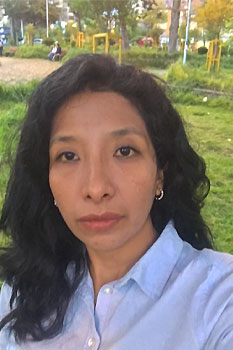gain a broader perspective
Roxana Quiroga Flores
Bolivia
"I especially enjoyed the video tours of treatment facilities and laboratories, as well as the interviews with professionals actively working in the field."
Roxana Quiroga Flores is a Environmental Biotechnologist from Bolivia. She participated in the online course PFAS - Persistent Micropollutants in the Water Cycle. Read about her experience.
What was your motivation for enrolling in this course/program? My research has primarily focused on the remediation of toxic metals. However, since pollutants occur together in the environment, it is advantageous to continue learning about other pollutants, especially those that have gained a lot of attention due to their persistent nature such as PFAS. I chose this course because I was eager to be introduced to the field of emerging pollutants—not only to expand my knowledge, but also to gain a broader perspective when dealing with multiple pollutants in complex matrices. I was also looking forward to connecting with researchers and professionals from around the world who are actively working in this field.
My research has primarily focused on the remediation of toxic metals. However, since pollutants occur together in the environment, it is advantageous to continue learning about other pollutants, especially those that have gained a lot of attention due to their persistent nature such as PFAS. I chose this course because I was eager to be introduced to the field of emerging pollutants—not only to expand my knowledge, but also to gain a broader perspective when dealing with multiple pollutants in complex matrices. I was also looking forward to connecting with researchers and professionals from around the world who are actively working in this field.
How did/will this course impact your career or life?
The content of the course definitely expanded my knowledge regarding PFAS and the challenges associated with their treatment. It broadened my mind in a practical way, highlighting key aspects to consider when setting up experiments, interpreting analytical reports, and weighing the implications of separation and destruction technologies. I believe this course will help me access new opportunities, either in my home country (Bolivia), where there is still much to be done, or abroad.
How was your experience of learning online?
I appreciated the up-to-date information provided each week of the course. The content on the platform was supported by the latest published research. I especially enjoyed the video tours of treatment facilities and laboratories, as well as the interviews with professionals actively working in the field. The assignments were well-designed to enhance critical thinking related to analytical reports and treatment trains for PFAS remediation. Until now, I had focused only on separation techniques, so I’m glad to have learned about destruction techniques as well. I suggest including live sessions after assignments are due, as I believe the discussions would be more fruitful and would offer more opportunities to interact with instructors and peers.
What advice would you give someone who is thinking of taking a similar course?
I would definitely recommend this course to others, especially those actively working on emerging pollutants. My advice to future learners is to make the most of each week's material, prepare questions for the live sessions with the instructors, and dedicate time to engage with your peers and instructors on the online platform. Much of the information in the course material can be explored in greater depth by asking questions on the platform, I suggest to take full advantage of it.

